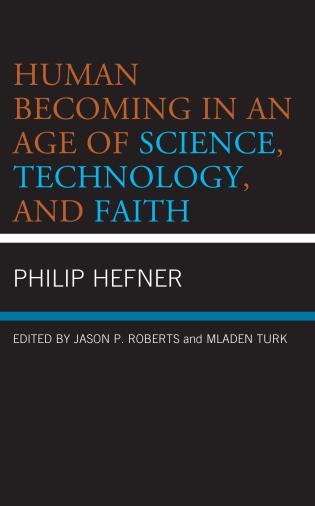
Book by Philip Hefner edited by Jason Roberts and Mladen Turk
Human Becoming in an Age of Science, Technology, and Faith
by Philip Hefner, Jason P. Roberts (Editor, Contributor), Mladen Turk (Editor, Contributor)
With contributions from Anna Case-Winters, Ann Milliken Pederson, Karl E. Peters, Ted Peters, Gregory R. Peterson
Editorial Reviews
Review
Philip Hefner’s understanding of humans as God’s “co-creators” is one of the most exciting ideas to emerge from the twentieth century encounter of Christianity with evolutionary thinking, transforming our notion of God from the Augustinian eternal being beyond time and space to a Creator ever active in the world alongside human beings. It is a joy, as well as deeply humbling, to have Hefner’s reflections on a life’s intellectual journey, and then to have the sympathetic reactions of his friends – and critics! — Michael Ruse, Florida State University
For several decades now, the created co-creator has inspired people from many walks of life and different cultural backgrounds. It is a concept and a vision that catches the relationality so central to all creation as well as the ambivalence and ambiguity inherent in human existence — congenial with Lutheran theology and at the same time transgressing confessional borders. So fitting with the new broad exploration of the vision in this volume! In times of crises human becoming of the created co-creator is urgently called for. — Antje Jackelen, Archbishop of Uppsala, Sweden
The philosopher Spinoza spoke of natura naturans, reality as bringing forth future reality. Everything is a product of the past, but also causally contributing to the future. The theologian Philip Hefner speaks of humans as created co-creators, active in culture and technology. Why focus on humans, ourselves? Because we, his readers, are humans. We contribute to the future in ways shaped by intentions, by our convictions. His creative theological voice may help each of us to understand ourselves and thereby become more free as creative creatures. — Willem B. Drees, Tilburg University, emeritus
In the early 1980s, long before the term ‘Anthropocene’ was coined, Phil Hefner proposed the term of the human as a ‘created co-creator.’ In this exciting book, we see Hefner’s self-reflective deepening of his earlier views of the human co-creator, followed by interpretations by his scholarly peers. This is a must-read book for theologians and scientists that do not wish to belittle the role of techo sapiens but are achingly aware of the fragility and failures of human creativity, especially in our ecological predicament. — Niels Henrik Gregersen, University of Copenhagen
Since coining the phrase in the 1980’s, for pioneering scholar Philip Hefner the term created co-creator is intended to operate at home in Christian theological and in secular scientific contexts in order to support their integration. If humanities’ evolution is the product of natural processes, human creativity is also God-imaging, and nature becomes the realm of divine purposes. I strongly recommend this book to all, scholars and lay people alike, to read and think deeply on Philip’s astounding achievement. — Robert John Russell, Graduate Theological Union
Hefner’s concept of the “created co-creator” has had broad impact across the religion and science field. This compilation extends and expands Hefner’s original ideas into new territory that is provocative and exciting. It should be read by students of religion and science; it has implications not only for theology but also for environmental studies, ethics and general biosciences. — Gayle E. Woloschak, Northwestern University
Accelerating technological developments and ever worsening climate changed have raised questions about the meaning of our humanity and scope of human power and responsibility. Philip Hefner has for several decades been at the forefront of those engaging those questions. Happily, in this new volume Jason P. Roberts and Mladen Turk have published recent work by Hefner on his theme of human beings as “created co-creators” and essays by a distinguished set of thinkers. Anyone interested in the religious and science discussion should read this volume. — William Schweiker, The University of Chicago
Philip Hefner here further expands and clarifies his theory of the created co-creator, which stresses that human freedom and values fully belong to nature but also that our world view should not remain limited to science. Here he turns up the soil and seeks new imagery that can help guide a technological civilization in which people must take responsibility for the future of people and the planet. Humility amid uncertainty turns out to be crucial. This becomes personal: we grope in the dark, seek the light, and must write our own memoirs. It is a sheer pleasure to read Hefner’s. — Arthur Petersen, University College London, UK
These pages make major new contributions to Philip Hefner’s concept of “created co-creator,” which has been widely influential across almost four decades. Hefner’s new chapters summarize and extend his previous work in significant ways, supported by in-depth commentaries by Jason Roberts and Karl Peters. Six leaders in the religion and science field then probe and apply the results. This volume will be a key resource for both students and scholars across the fields of science, technology, ecology, theological anthropology, and theological ethics. — Philip Clayton, Claremont School of Theology
Creating is our essential humanity. From Gregory of Nyssa to robots to evolutionary theory, climate science, Luther, and more, Hefner and a team of collaborators extend the image of God into all creatures, all creation. This book reads like a love letter, freeing us from dead ends of cynicism and progressivism, to engage in creating—extending God’s presence in the world. — Barbara Rossing, Lutheran School of Theology at Chicago
About the Author
Philip Hefner is a theologian and poet. He is professor emeritus of systematic theology at the Lutheran School of Theology at Chicago.
Jason P. Roberts is senior lecturer of Christian theology and affiliate faculty of the Sustainability Certificate Program at the University of Georgia, Athens.
Mladen Turk is professor and chair of the religious studies department at Elmhurst University.